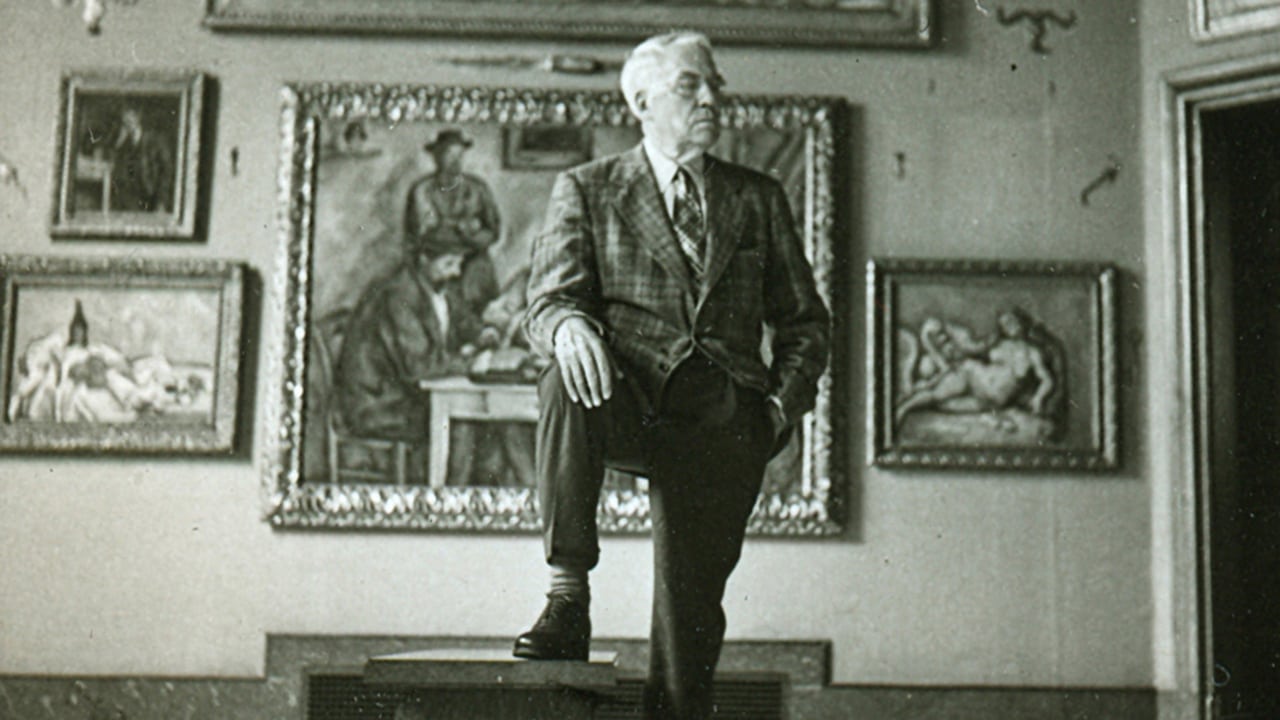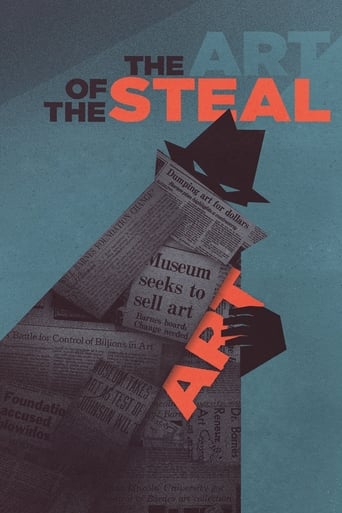GamerTab
That was an excellent one.
Whitech
It is not only a funny movie, but it allows a great amount of joy for anyone who watches it.
TaryBiggBall
It was OK. I don't see why everyone loves it so much. It wasn't very smart or deep or well-directed.
Cristal
The movie really just wants to entertain people.
runamokprods
Interesting and entertaining look at how a bunch of the powerful in Philadelphia basically conspired to take one of the great modern art collections in the world away from it's home in the suburbs, , and transplant them into Philadelphia proper, against the express wishes left in Albert C. Barnes will (made in 1922). While there's no question the tactics used by those in power are sleazy, the film also ignores what I consider a key issue: Is it really such a bad thing that one of the most amazing collections of modern art be much more accessible to the public, even if it violates the will of a man with no heirs who has been dead over 50 years? At what point do old grudges - going both ways - count less than art belonging to the world? I'm not saying there are neat answers to such questions, but the film acts like there's no moral murkiness at all. Similarly the film uses questionable tactics to argue its case. For example it's constantly stating how those on the 'other side' refuse to be interviewed. Yet, it is clear that the ideology of the film-makers is known to all involved -- the film is financed by one of the leaders of the group fighting against the collections movement, and guards at a gathering of those planning the art move know not to allow in this specific film crew, even mentioning their production company name. If you knew you a film was being made whose basic premise is that you're a swindler a cheat and a thief with no respect for art, would you agree to be interviewed? Additionally, some of those who seem so calm and well reasoned while being interviewed and arguing the art should be left where it is, seem a little less impressive when you see them outside that same gathering screaming 'philistines!' at those going inside. None-the less, I still enjoyed the film, and there's no question it does a good job exposing the fact that many of our biggest public trusts and charitable institutions have a lot going on besides 'acting in the public interest', and are willing to play dirty pool to get what they want. I just find it hard to see this as a case of moral outrage to rank with the Iraq war, or starving children, or the U.S. educational crisis. It's basically rich people hating on rich people. Fun, but not as nutritious as all that.
penberthyp
In the eleventh hour Merion township forgets it's gripes about bus traffic and realizes it might lose something valuable. After forbidding the Museum to build a 56 car parking lot in a very petty fashion the neighbors of the foundation are portrayed as victims of the move at the end of the movie. I'm sorry. Glanton may be a clod, but he was forestalling what turned out to be the inevitable move of the collection to Philadelphia. Would you rather have the art tour the world temporarily or have it moved permanently to Philadelphia? When you don't bend you break. This is a very sad loss, but I can't help feel that there is no righteous side in this saga. Poor Merion? You mismanaged your asset, ditto Lincoln University. It's sad that there was no brilliant person to manage the estate and oversee it's protection. Incompetence loses to a powerful people with tourist dollars in their eyes.
usrosie
A remarkable, thought provoking documentary that I thoroughly enjoyed, even though I had no prior knowledge of the events – already well explained in previous reviews.I couldn't help but bring to mind the putative words of Pretty Boy Floyd:"Well, as through the world I've rambled, I've seen lots of funny menSome will rob you with a six-gun, and some with a fountain pen".There's an awful lot of robbing going on here, poignantly underlined in the scene as flamboyant signatures are exchanged by the mayor of Philadelphia and the Barnes Foundation as they signed their 'deal'. I can't say that any of the robbers in this film were particularly funny. In fact every time the story cried out for the other side of the story, a message on the screen said so-and-so declined to be appear on film, or declined to be interviewed, or declined to speak on the record… whatever. I'm not sure how the film can be accused of being one sided when the other side wouldn't say anything. Actually the cowardly shame of their silence spoke volumes…Kudos do, however, go to governor Rendell for actually appearing on film and putting his view, sincere as it appeared, although quite clearly having little regard for the fundamental issues at root – the clearly stated wishes and the will of Dr. Barnes about his art collection. In these reviews I've seen arguments about how it's going to be seen buy more people, in a more accessible location etc. But it's quite obviously not what Dr Barnes wanted for his collection. Call me old fashioned but I think his wishes should have been be accorded priority.
John Gilpatrick (jlg310)
The Art of the Steal—another great doc in what's already being dubbed the best documentary year in a long time—does something seemingly impossible. It crafts a compelling and informative story about art galleries. It sounds as dry as the Sahara on paper, but the story is surprisingly engaging. I objected to director Don Argott's almost completely one-sided approach to the material, but as long as you keep that in mind throughout, this can be a truly rewarding experience.The film centers around Dr. Albert C. Barnes, a wealthy, anti-establishment suburban Philadelphia native who, in the first half of the 20th century, amassed one of the most impressive and expensive private art collections in history. The Barnes Collection consists of 181 Renoirs, 69 Cezannes, 59 Matisses, 46 Picassos, 16 Modiglianis and seven van Goghs, among other pieces of work, and it resided in Merion, PA, just outside of Philadelphia. When he died, an epic struggle for power and control broke out which has yet to be completely settled. If anything, it has escalated since Barnes' death.Barnes despised the rich, famous, and powerful of Philadelphia. His number one enemy was Walter Annenberg, who operated the Philadelphia Inquirer. And Barnes made his collection incredibly exclusive as a result. As one commenter stated, Barnes denied access to the New York Times art critic, but he'd let the town plumber come in any time of day. After Barnes suddenly died in a car crash, the vultures began to circle, but his will outlined very specific instruction on what should happen to his art. Control over the art passed down to a number of his "disciples," and it was made clear that the art wouldn't be moved.After the last of the disciples died, control went to Lincoln University, a small black college. Their presidents slowly shifted away from Barnes' wishes over time. One president, Richard H. Glanton, took the art on tour and attempted to expand hours to make the art more accessible. Glanton was despised by those loyal to Barnes (many of whom are the primary interview subjects in the film), but he was small potatoes to what the politicians and non-profit organizations did next.The story has the capability to frustrate you. Going against a man's will seems like a really despicable thing to do. But when you sit back and think about what's actually happening, some interesting questions are raised. What's really best: to keep this priceless art hidden at the request of a somewhat bitter man who died more than 60 years ago, or to open it up to the public and let everyone learn and appreciate the incredible work on display? This might be an instance in which what's best and what's right are in opposition, but the film raises the questions. Unfortunately, it doesn't take the time to explore them.The film is incredibly one-sided, more so than any documentary, outside the Michael Moore catalog, that I've seen in a long time. The only person interviewed that isn't a Barnes disciple is Glanton, and it appears he's only on hand because he wants to prove he wasn't as bad as what came after him.This year is already being talked up as one of the best in a long time for documentaries. Joan Rivers: A Piece of Work was one of my favorite films from the first part of the year. Inside Job and Countdown to Zero received very positive buzz out of Cannes. And Exit Through the Gift Shop and Restrepo, among others, have already opened to rave reviews. And that's not even discussing what's coming later this year. I've never been a huge fan of documentaries. Perhaps that's because I was a student and didn't care to sit through a lecture, no matter how interesting the subject might have been. This year, that has definitely changed.

